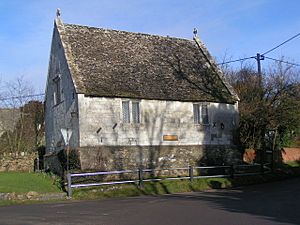Tom Brown's School Museum facts for kids

View of Tom Brown's School Museum
|
|
| Lua error in Module:Location_map at line 420: attempt to index field 'wikibase' (a nil value). | |
| Established | 1984 |
|---|---|
| Location | Uffington, Oxfordshire, England |
| Type | Local museum |
| Founder | John Little |
Welcome to Tom Brown's School Museum! This cool local museum is in the charming village of Uffington, which is in Oxfordshire, England. It first opened its doors in 1984, inviting everyone to explore the history of the area.
What You'll Find Inside
This museum is packed with interesting things! It tells the story of local history and shows off amazing finds from archaeology (that's studying old things people left behind).
You can also learn about famous people connected to Uffington. One is the author Thomas Hughes (who lived from 1822 to 1896). He wrote a very famous book called Tom Brown's School Days.
Another famous person is the poet laureate Sir John Betjeman (1906–1984). He was a special poet for the country and actually lived in Uffington!
The museum also teaches you about the amazing and ancient Uffington White Horse. This giant chalk figure is carved into the hillside nearby.
A Special Building
The museum itself is in a very old building. It's a 17th-century schoolroom, which means it was built in the 1600s! This very schoolroom was even mentioned in Thomas Hughes's famous novel, Tom Brown's School Days. It's right next to the churchyard.
See Also
- List of museums in Oxfordshire
- Museum of Oxford
External Links
- Tom Brown's School Museum website
 | Jewel Prestage |
 | Ella Baker |
 | Fannie Lou Hamer |

